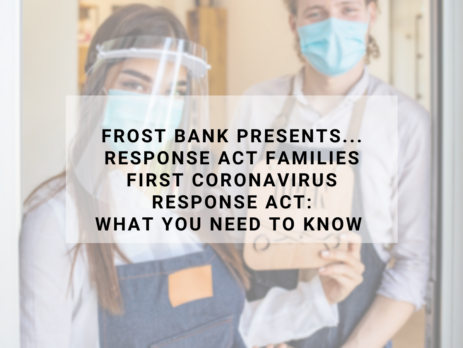Over the recent weeks, there have been a number of unprecedented changes in the law beginning with the signing of H.R.6201, the Families First Coronavirus Response Act (FFCRA). There are a many provisions included in the act that affect you as a small business. If you’re wondering how this may affect your business, this article provides insight on:
· Emergency paid sick leave
· Family Medical Leave Act (FMLA) expansion
· Refundable payroll tax credit
Emergency Paid Sick Leave:
Emergency paid sick leave and the expanded FMLA are two separate provisions included in the FFCRA. However, they work in tandem and do have similarities. As an example, both provisions apply to employers with fewer than 500 employees.
Following April 1, 2020, employer paid sick leave covers the first 80 hours to leave for all employees who fall under one or both of the two definitions provided by the DOL:
· Two weeks (up to 80 hours) of paid sick leave at the employee’s regular rate of pay where the employee is unable to work because the employee is quarantined (pursuant to Federal, State, or local government order or advice of a health care provider), and/or experiencing COVID-19 symptoms and seeking a medical diagnosis; or
· Two weeks (up to 80 hours) of paid sick leave at two-thirds the employee’s regular rate of pay because the employee is unable to work because of a bona fide need to care for an individual subject to quarantine (pursuant to Federal, State, or local government order or advice of a health care provider), or care for a child (under 18 years of age) whose school or child care provider is closed or unavailable for reasons related to COVID-19, and/or the employee is experiencing a substantially similar condition as specified by the Secretary of Health and Human Services, in consultation with the Secretaries of the Treasury and Labor. https://www.dol.gov/agencies/whd/pandemic/ffcra-employer-paid-leave
Family Medical Leave Act (FMLA) expansion:
Once an employee has exhausted their 80 hours of paid leave they could possibly qualify for the expanded FMLA provision included in the FFCRA. In order to qualify for expanded FMLA an employee must have been employed by the company for 30 days and is unable to work due to a bona fide need for leave to care for a child whose school or child care provider is closed or unavailable for reasons related to COVID-19. Employees who meet both of those requirements qualify for an additional 10 weeks of pay at two-thirds their standard pay.
Small Business Notice:
If your business has fewer than 50 employees and complying with the emergency paid sick leave and expanded FMLA would jeopardize the viability of your business there is a possible exemption. The U.S. Department of Labor released Frequently Asked Questions that address exemptions from the FFCRA for small businesses.
Refundable payroll tax credit:
Employers will not be required to bear the cost of the emergency paid sick leave and emergency paid FMLA described above. Instead, these amounts are reimbursable through a 100 percent refundable tax credit against each employer’s portion of Social Security taxes, which can be claimed quarterly. If the amount of the tax credit exceeds the employer’s aggregate Social Security tax liability for the quarter, the excess may be refunded directly to the employer.
ADDITIONAL RESOURCES:
H.R. 6201: https://www.congress.gov/bill/116th-congress/house-bill/6201/text
White House Press Release: https://www.whitehouse.gov/briefings-statements/bill-announcement-88/
Please note this is a fluid situation and information in the article is based current rulings and guidance provided by the Department of Labor and has the ability to change as this situation evolves.


